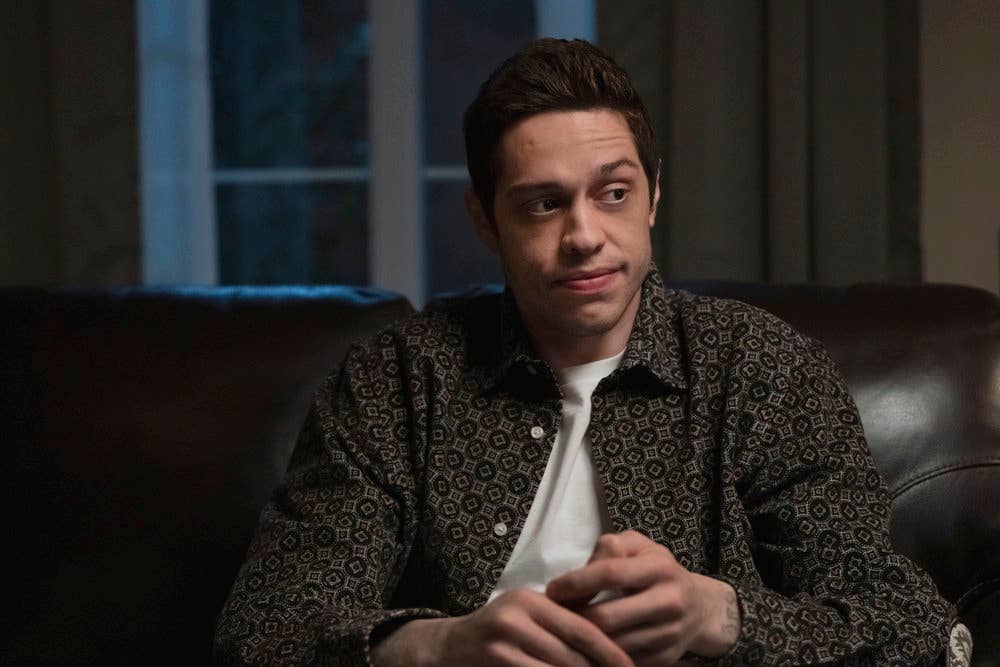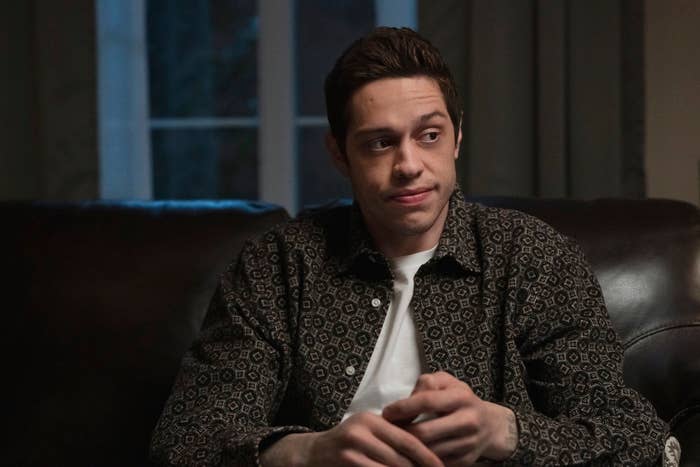
Judah Miller is happy to be haunted.
“It’s like a fever dream,” he tells Complex when describing a key moment on the set of Pete Davidson’s Bupkis involving, of all the cameos in all the world, Art the Clown.
For those not familiar, Art is the central figure of the hit slasher franchise Terrifier. In theory, and certainly in less competent hands, the appearance of Art in a semi-autobiographical series—which sees Miller serving as showrunner, co-writer, and executive producer—about one of the most famous comedians on the planet might not work. But in the boldly genreless and inspiringly original Bupkis, a mass-murdering clown fits right in.
In fact, the series is a decidedly accomplished “fever dream” on all fronts. After watching an early cut of the series’ inaugural season, Complex spent some time chopping it up with Miller about bringing his friend’s “relentlessly absurd” life to Peacock. As we touch on in the full conversation below, it’s this very absurdity that makes Bupkis so relatable. Catch all eight episodes on Peacock on May 4.
This conversation has been lightly edited for clarity.
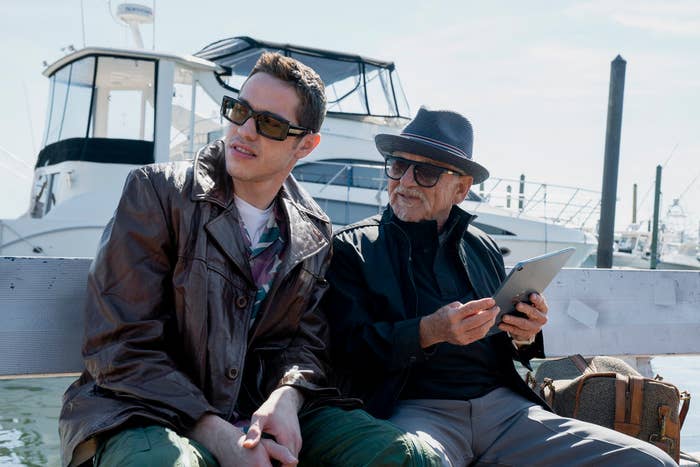
To start, could you take me back to when this idea first started coalescing? I’ve seen Pete talk about how he treated it like an exercise, almost, more than anything.
Pete and I met on the movie The King of Staten Island and we just gravitated toward each other because we have pretty similar comic sensibilities and we became friends. During the pandemic, Pete reached out to me and was like, “Do you wanna write a pilot with me and Dave [Sirus]?” and I was like, “Absolutely.” And we just started writing the show in this vacuum of the pandemic, which I think is part of, you know, why this show—we were taking such liberties with the shifting tone.
Right!
We were just writing these episodes in this vacuum and really just doing whatever made us laugh the hardest, [that] was what we allowed the show to do. And then we started getting into more emotional territory and dramatic territory. We wanted the show to have a boundlessness to what it was able to do and I think that’s part of what makes this project unique.
Well, I think you definitely achieved that. Tonally, it kind of—it’s all over the place but every shift works. And a big part of that is, I think the cameos are very tastefully done. Like, they all serve a part of the story specifically. But I have to ask about Art the Clown. Whose idea was that?
That was Pete. Again, like, so much of the casting in this show is a collection of some of Pete’s favorite things. Terrifier is something that Pete introduced me to and I became a fan of it as well. But it was, yeah that was—that’s gonna haunt everyone’s dreams, I think. To have that and to be on the set working on the show and to have Art the Clown in your production is, like, I describe this show as like a fever dream. Because Pete’s life is kind of like an absurd fever dream. And again, yeah, going to work and having Art the Clown be standing at the trailer with you is like a fever dream.
And in terms of the cast, I mean, you have Joe Pesci who is basically retired. I feel like he did a single TV series 40 years ago or something. [Ed. note: Half Nelson was 38 years ago]. Could you tell me when you guys learned, like, “Alright. Joe’s gonna be on the show.” When did that happen?
It feels like a wonderful fever dream! It’s something that you can’t ever expect to be able to work with one of the greatest actors of all time like Joe Pesci. I mean, he’s been involved in some of the most incredible moments in the history of movies, so to get him to be part of this series felt impossible. But again, like, Pete is a dreamer and he aims very high.
People say something’s impossible but then, you know, Pete and Joe really connected. I think that they actually have a lot of similar qualities and I think Joe developed, like, a real kind of grandfatherly type of love for Pete. That was incredible to see happen during the show. But yeah, it was a process of, you know, reaching out to him, having him read the material, and meeting with him. But again, it feels like the stars have aligned to give us power. It’s unbelievably humbling to write something and then have people like Joe Pesci, Edie Falco, Brad Garrett, and Bobby Cannavale—there are so many incredible talents that are elevating what we wrote. It’s just, it’s astounding.
Yeah, and it really all came together. I have to say, just in the middle of this, I loved this show. It’s one of my favorite new shows of the year, probably. I really connected with this show.
That’s so great to hear because the show took such risks and, like, is so kind of tonally erratic. It’s like, you never know. But the response we’re getting has been incredible. I feel like the greatest compliment that I’ve received about this show is that someone watched the pilot and told me, like, “Man, I’ve never seen something like this before.” In this age that we’re in, where so much has been done and there’s so much amazing content, to have something that stands out just feels so validating to hear that.
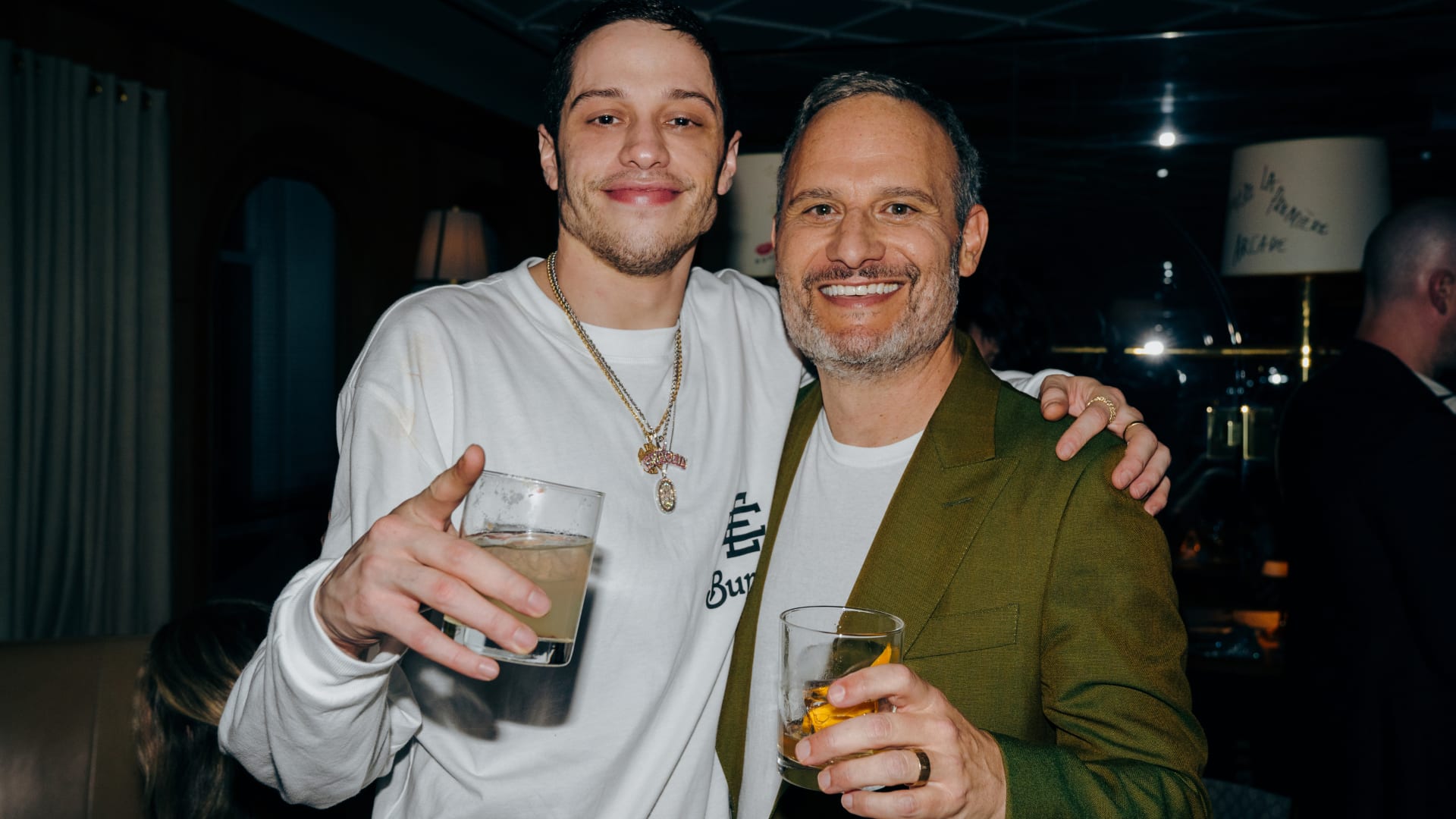
Well, I think it stands out because it’s such a hyper-specific viewpoint in a way but then you get that specific and it becomes universal. I feel like it represents a generation. I feel like I was seeing my friends on the screen, and I feel like a lot of people are gonna connect with it in that way. In the creative process, was there a moment where you felt like maybe you were getting too specific and we need to pull it back a little bit? Did that ever happen in the process?
I mean, you know, because Pete was so intimately involved in developing these stories and these episodes with us we didn’t really cross boundaries in terms of areas that we didn’t touch upon. But that being said, you know, a lot of what we’re dealing with in this show is the disparity between Pete’s public persona and his private life—the way that his family and friends actually know him to be.
I think that some of the issues that are involved in that are so relatable, especially in the world today, where you don’t have to be famous to have a public persona or interactions with people that aren’t part of your actual friends. So Pete trying to focus on having more meaningful connections with his family and loved ones and the obstacles that he’s presented with in doing that are things that everyone can relate to. Whether you’re a world-famous comedian or not.
Yeah, I would agree. I saw in an interview where Pete said it was important to him to keep, like, an “egoless set,” I think that is how he put it. Would you say that was true? What did you see as the benefits of that more collaborative framework?
There’s just a real sense of, like, joyfulness that we had. I think, because we were all friends going into this project, that we had a sense of fun and playfulness that kind of comes through in the project, in the product. There’s a sense of anarchy that we wanted to have within this show where we can tell a story that’s very dramatic or poignant or finely crafted and then completely take the piss out of it and turn it on its side into an absurdity.
And weirdly, that seems to capture real life. Because sometimes the darkest and most depressing moments in your life can also be very comedic and absurd. It was just an incredible, fun experience. The first day that we were shooting with Joe Pesci, Pete wheeled this speaker that was the size of a rolling bag onto the set and he was blasting Frank Sinatra or, like, Dean Martin. It completely changed the vibe. It’s like he brought the vibe of Joe Pesci to the set. And it’s things like that were happening constantly on set. It was just a very, very fun show to make.
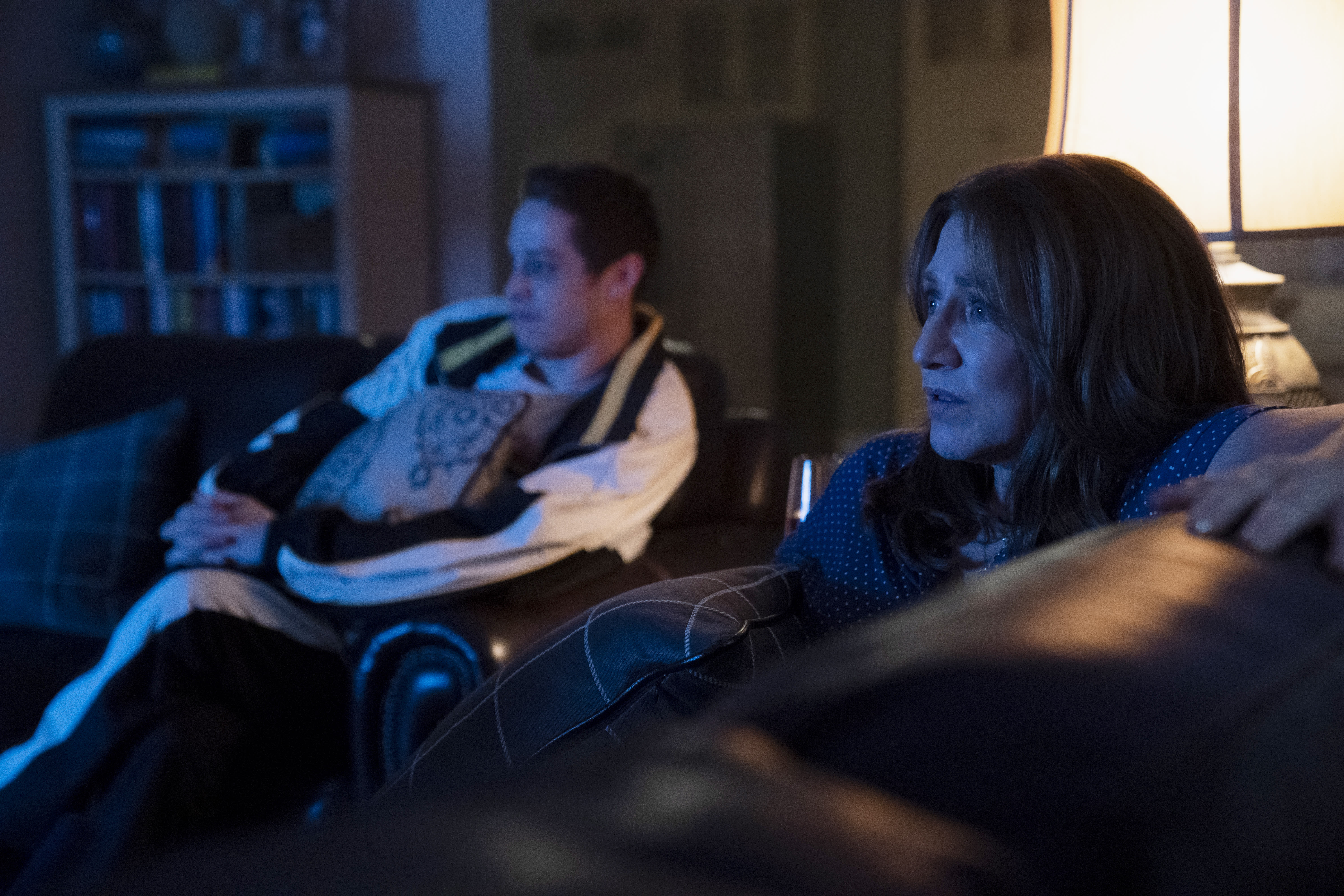
From a creative standpoint, and I won’t spoil it, but the opening scene with Pete and his mother—was that always the opening scene, or did you go through a few iterations of that?
That was always our opening scene!
Yeah? [Laughing.]
And it was a controversial scene. We wanted to start with a bang [Laughing.] When we were working on the pilot, the term “relentless” was thrown around a lot. We wanted there to be a relentlessness and an increasingly-building-upon-itself kind of tone. The question that we had was, like, can we start like this and continually and relentlessly escalate things through the pilot and then somehow top the opening sequence and then make it heartwarming? And then we were like, I don’t know. It’s ambitious. We don’t know if we’re gonna be able to do this. But this is what we wanna do and we believe we can do.
Right, right.
I really feel like we succeeded in doing that in this pilot, which again was amazing that we got actors to agree to sign on to do this with us.
Is there a particular moment, anything from set, or a particular memory that you’re gonna hold with you from doing this show for the rest of your life or the rest of your career that just stands out as, like, “Whoa! I pulled this off.”
I mean, honestly, for me there are so many moments of making this show that I’ll remember for the rest of my life. But working with Joe Pesci, having him as a mentor. He has such a wealth of knowledge from his career and I think, like, to me—just going through the script with Joe Pesci in his trailer, talking to him about his character, talking to him about his experiences making movies with [Martin] Scorsese. [That’s] something that I will remember and cherish for the rest of my life, for sure.
I would imagine so. Is there an ambition beyond, you know, doing multiple seasons here or do you view this as an encapsulated one-season kind of thing? Has that been discussed?
I think, right now, we’re just focused on finishing this first season and excited for people to hopefully enjoy the first season and then see where it goes from there. But yeah, we’re just really excited to check out the first season.
Was there a conscious effort to—because I know that the director of Big Time Adolescence [Jason Orley] is also directing on Bupkis—were you trying to really bring these people in on purpose as trusted people to tell such a personal story?
Yeah, I think that like, especially with the subject matter that we’re dealing with in this show, Pete really wanted to work with people that he’s close with and that have a knowledge. A lot of the people that worked on this show have known Pete for years and I think that that creates a shorthand for us creatively. Besides the fact that there’s almost like a family dynamic to our crew of a lot of us—like Jason Orley, who did Big Time Adolescence and has worked with Pete before, and Dave Sirus who’s worked with Pete for many years. We know Amy Davidson, his mom. We know Casey, his sister. These are not like, this is not a documentary. These characters are not exactly the same as they’re portrayed in this series. But, like, I think that familiarity and the closeness definitely contributed to some of the more intimate subject matter that we’re touching upon in the show.
You mentioned his family a little bit. Have they seen early cuts of the episodes yet?
Yes, I believe that they have. And yeah, I mean, it’s just incredible, you know. Some of our episodes are really touching on very specific and poignant moments from Pete’s actual family history, it’s incredible the access that audiences will have to very emotional, poignant, hilarious aspects of Pete’s life.
Were there other examples of semi-autobiographical films or TV series that you looked to as a North Star, like, these people did it right and we should aim for this?
Man, I’m trying to think. There are so many, like, there are so many reference points. But in a way this show, it’s so the mind of Pete and so inspired by the absurd fever dream that it is to be in Pete’s orbit. When you’re Pete’s friend, you get pulled into absurd situations constantly. When you hang out with him, there are so many times where I would say, like, “Man! This could be in Bupkis!” Because his life is somehow relentlessly absurd. So I don’t think that we were looking for a separate project. I think that just trying to capture the vibe of what it is to be in Pete’s orbit was the goal and I think that’s what led us to creating something that is so tonally erratic.
Right. That makes sense. Is there any advice you would give to a young writer embarking on their first big project?
The biggest thing I tell people is to write something that you love. Like, don’t try to write something that is trying to emulate something else that’s successful. Don’t try to second-guess what is marketable. I think Bupkis is an example of something that was written completely in a vacuum. We wrote it for ourselves. We wrote what made us laugh the hardest and we made moves in this show that I think some people thought were risky but made sense to us. I think you have to have faith in your own sensibilities and whatever excites you the most. Write something that you would like to watch, like, that’s something that is always the best advice I can give to any young writer.
Sign up for Peacock to stream NBCU shows

